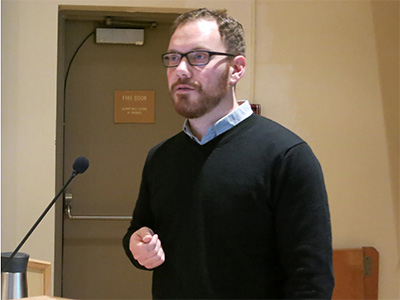
UHN Bioethicist Dr. Daniel Buchman discusses how to manage patient and family requests for caregivers of a certain background at Toronto Rehab’s Bickle Centre earlier this month.“The challenge is to protect health-care providers from being disrespected and harmed while maintaining our obligations to patients.”(Photo: UHN)
"Can I have a nurse who is... you know... more like me?"
"Can I please have a dietitian who speaks English as a first language?"
"Can my father get a male physiotherapist instead? He needs someone really strong!"
These are the types of questions that a UHN Bioethicist, Dr. Daniel Buchman, addressed during the second of four Bioethics Rounds at UHN entitled, "Responding to patients' & families' preferences for their healthcare providers."
These rounds are a new initiative from UHN Bioethics that rotate among UHN hospitals and sites, and address everyday ethical issues encountered by staff. The basis for some of these patient and family preferences for certain caregivers may include race, gender, age or sexual orientation.
"Some of these rare requests can create ethical tensions for health-care providers," explains Dr. Buchman.
"Providers have a duty to deliver care consistent with patient preferences. However, providers also have commitments from legal, professional and institutional organizations that they should not experience discrimination in the workplace."
Protecting health-care providers and patients
The initial approach to patients and families who request health-care providers from a particular background should be to ask
why, explains Dr. Buchman, particularly because "not all requests will be unjustifiably discriminatory."
Clarifying the reason behind a patient's or family's wishes may help staff understand that the request isn't discriminatory, but is rather rooted in a patient feeling more comfortable with someone who, for example, speaks their language. Patients' experiences of past trauma, or cultural beliefs that they should be cared for by someone of their gender, may also form the basis for caregiver preferences.
"Patient preferences aren't always black and white," explains Toronto Rehab Registered Dietitian Amanda Beales, who attended the session at Toronto Rehab's Bickle Centre earlier this month.
"It's a bit complex. Sometimes, for example, if the patient doesn't speak any English and there's a staff member who speaks their language, it can be quite comforting. At the same time, it may not be fair to that staff member to always have to be with that patient if, for instance, the patient has heavier care needs."
During his presentation, Dr. Buchman discussed UHN's Caregiver Preference Guideline, which outlines how to manage patient and family requests for a healthcare provider from a particular background.
In addition to trying to clarify the reason for the patient's wishes, Dr. Buchman told the audience that it is important to offer support to all staff that are affected by such requests. Documenting these requests and ensuring that the management of the request meets Ontario's Human Rights Legislation and hospital policies is also important. A manager must also ensure that the request is clinically and operationally feasible.
In scenarios where patients have limited proficiency in English, UHN has access to professional interpreters to assist the care team.
The next Bioethics rounds on Responding to patients’ & families’ preferences for their health-care providers are taking place at the following UHN locations:
Feb. 2, 2016
12 – 1 p.m. | Room 6-103, Fell Building,Toronto Western Hospital | Dr. Kyle Anstey, Senior Bioethicist, TWH |
| March 1, 2016 10 – 11 a.m. | Safety and Quality Learning Rounds with the ABI team, ABI 1S Gym,
Toronto Rehab, University Centre | Ms. Ann Heesters, Associate Director, Bioethics, TRI |
| March 8, 2016 12 – 1 p.m. | Room 6-702-703,
Princess Margaret Cancer Centre | Dr. Jennifer Bell, Bioethicist, PM |
These rounds are available to additional teams at UHN upon request.
Avoiding harm and maintaining obligations
There are numerous ethical issues to consider in a situation where a patient is requesting a health-care provider of a particular background over their existing health-care provider, whether their request is granted or not.
"The challenge is to protect health-care providers from being disrespected and harmed while maintaining our obligations to patients," explains Dr. Buchman.
In a situation where a patient's request is honoured, both affected and neighbouring staff, as well as other patients may feel that discriminatory actions were condoned by the organization. This could subsequently compromise trust in the organization's ability to protect them.
On the other hand, if a manager declines a patient's request, it could mean denying them treatment and care. It may then also appear that the organization isn't respecting the patient's personal or cultural beliefs, or is triggering past traumatizing experiences.
Dialogue and patient-centered care
Maria Chiera-Lyle, Advanced Practice Nurse Educator for Complex Continuing Care at Toronto Rehab's Bickle Centre, who also attended the presentation, emphasizes the importance of having a dialogue with patients when they make requests like these, because the bottom line is to provide the best patient care possible.
"What I've learned is to stop and reflect on what the patient's asking," says Maria, citing
UHN's 4 As in customer service: Acknowledge, Ask, Act and Ask Again, as fundamental to her approach.
"In my personal experience, I've encountered situations where dialogue reveals that the patient's request is gender-based because of an unpleasant personal experience," she says.
"First we have to identify where the patient is coming from, pause and reflect on their request, and then – providing that their request is appropriate – act on what they're requesting because we want to make sure they are receiving the utmost highest quality care," adds Maria.
One goal of the UHN Bioethics Rounds is that, "attendees will become familiar with UHN's Caregiver Preference Guideline and how they might use it should a situation related to caregiver preference arise," explains Dr. Buchman.
"We also hope that the attendees will become more familiar with the UHN Bioethics Service, and how we can work with patients, families, and staff in managing other ethically complex situations."
